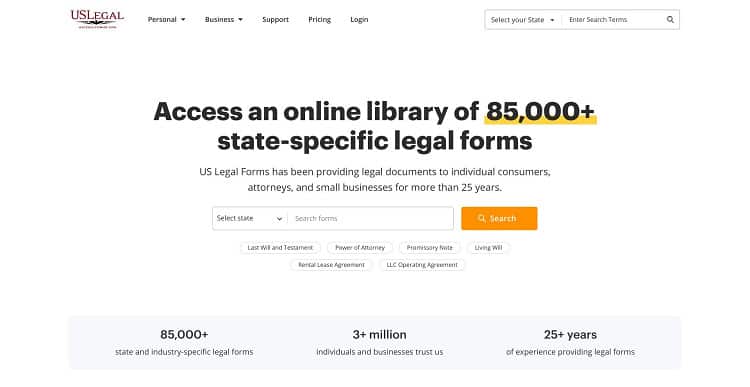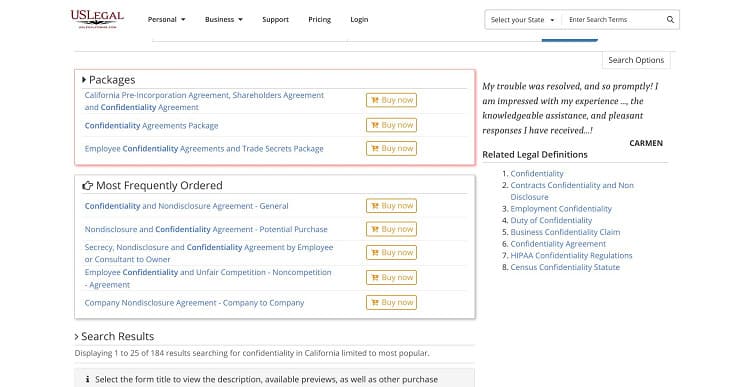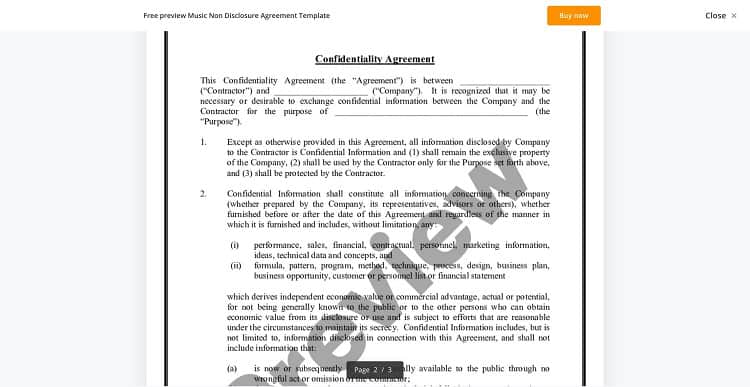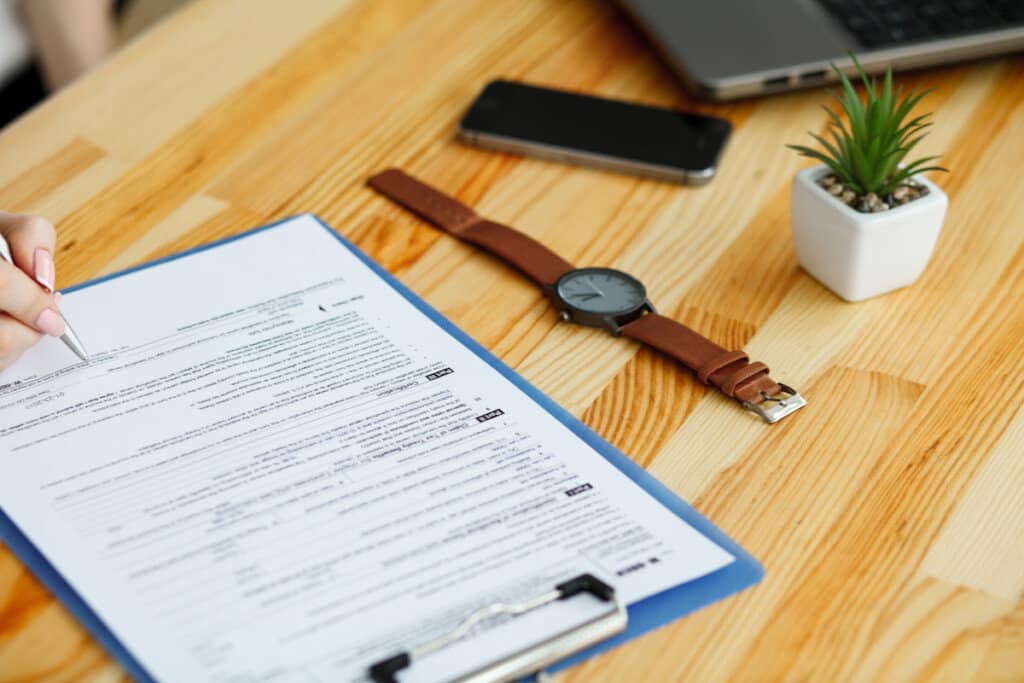Last Updated on July 19, 2023 by Ewen Finser
If you’re looking into using a legal platform to help you with important paperwork, you might wonder which forms will be the most useful to protect your ideas, business deals, or acquisitions. Although they sound similar, there is a difference between a confidentiality agreement vs NDA, and which one you go for depends on the kind of information you want to share. I know from experience what it feels like to have ideas stolen and reworked; it’s a painful life experience and can be tricky to resolve legally. However, individuals and businesses can protect themselves legally using either a confidentiality agreement or an NDA. Obtaining this important paperwork is made easier with platforms like US Legal (see our US Legal review), but it’s important to pick the right form for your needs. Here’s the key difference between the two.Confidentiality Agreement vs NDA -The Bottom Line Up Front
The main difference between an NDA and a confidentiality agreement is the manner of communication. An NDA is useful if you have created something and want to allow people access while keeping it safe; confidentiality agreements are better for joint collaborative projects. The difference between the two is subtle. Regarding practical use, NDAs tend to be used when one disclosing party is sharing information and confidential material, while confidentiality agreements are used when more than one party is mutually sharing information back and forth.
Why Go with US Legal?
Save on Legal Here
Access an online library of 85,000+ state-specific legal forms. US Legal Forms has been providing legal documents to individual consumers, attorneys, and small businesses for more than 25 years. I use US Legal as an affordable midpoint between hiring an attorney or service and "DIY".
We earn a commission if you click this link and make a purchase at no additional cost to you.
What is a Confidentiality Agreement?
Confidentiality agreements are ideal for joint projects. For example, say you’re working on a project with two or more collaborative teams; all of you would sign a confidentiality agreement to keep sensitive information private. The consequences of breaking a confidentiality agreement are pretty severe. You could be on the receiving end of a lawsuit and have to pay damages.When to Use a Confidentiality Agreement vs NDA
Confidentiality agreements can be used to protect everyone working on joint projects together. It should outline when the project begins and ends, what goals must be reached, and what each party must do. It also means that everyone signing agrees not to share sensitive information with outside parties. They can also be used during company mergers, acquisitions, and negotiations. Everyone involved in this process (even involving several organizations) agrees to keep sensitive data private. You can see how this would be useful in protecting your business interests: it can help to stop any potential leaks, which could be damaging. Employees can also use confidentiality agreements when they are onboarding new employees, as well as protect their interests when an employee leaves (“employee confidentiality agreement”).What is an NDA?
 NDAs uphold confidential information by requiring anyone who has access to sensitive information to sign.
So, for example, if you have created something (like an invention), you can use a nondisclosure agreement to preserve your secret information until you can file a patent.
They’re particularly useful when you’re about to search for investment. Your confidential information will be protected because anyone accessing it has to agree not to pass it on.
Breaking an NDA can trigger a lawsuit or require you to pay damages.
NDAs uphold confidential information by requiring anyone who has access to sensitive information to sign.
So, for example, if you have created something (like an invention), you can use a nondisclosure agreement to preserve your secret information until you can file a patent.
They’re particularly useful when you’re about to search for investment. Your confidential information will be protected because anyone accessing it has to agree not to pass it on.
Breaking an NDA can trigger a lawsuit or require you to pay damages.
When to Use an NDA
You can use an NDA to protect your ideas from potential investors. You can also use them to share sensitive information with people outside your business: anything to do with new projects (such as intellectual property), proprietary information, or ideas can be protected by an NDA. Start-up companies can use NDAs to prevent investors from stealing ideas. Plus, if you decide to get an outside consultant to help manage your business, you can get them to sign an NDA to protect your ideas. Sometimes, employers can require employees to sign an NDA if they’re working on a certain project; this means that they can’t tell anyone else outside of that project about it, preventing any potential damage to your company.How to Find a Confidentiality Agreement/NDA
Buying a pre-written form is the easiest way to create a confidentiality agreement or an NDA. This reassures you that the legal contract will be binding and saves you time and stress trying to get an attorney. This is where online legal platforms come into play. I recommend using the platform US Legal for this purpose – it’s one of the simplest platforms to access important legal documents. You can search for forms that apply to your state, and they have a range to pick from: For example, they have a general confidentiality and nondisclosure agreement. On top of this, they have a huge variety of more specific versions, including secrecy confidentiality agreements for board members, employees, potential purchasers, and more.
It’s a similar story for NDAs: they offer company-to-company NDAs, reciprocal NDAs, and NDAs for designers, musicians, video producers, and writers.
For example, they have a general confidentiality and nondisclosure agreement. On top of this, they have a huge variety of more specific versions, including secrecy confidentiality agreements for board members, employees, potential purchasers, and more.
It’s a similar story for NDAs: they offer company-to-company NDAs, reciprocal NDAs, and NDAs for designers, musicians, video producers, and writers.
 Using a specific NDA can be more helpful than using a generic NDA. It can help to deal with some of the nuances of working within certain industries.
It’s reassuring to know that these forms will cover your back, allowing you to get on with finding investors or collaborators for your next project.
Using a specific NDA can be more helpful than using a generic NDA. It can help to deal with some of the nuances of working within certain industries.
It’s reassuring to know that these forms will cover your back, allowing you to get on with finding investors or collaborators for your next project.
 Forms can be completed using document signing platforms (pdfFiller and SignNow), meaning you don’t have to be in the same room as the other party to sign the forms together.
They will be stored on US Legal’s secure network (they use banking-level data security, so you shouldn’t have to worry about breaches).
It’s worth noting that the basic price plan doesn’t unlock the ability to collect eSignatures; this is locked behind the Premium plan, which costs $15 monthly.
Forms can be completed using document signing platforms (pdfFiller and SignNow), meaning you don’t have to be in the same room as the other party to sign the forms together.
They will be stored on US Legal’s secure network (they use banking-level data security, so you shouldn’t have to worry about breaches).
It’s worth noting that the basic price plan doesn’t unlock the ability to collect eSignatures; this is locked behind the Premium plan, which costs $15 monthly.
Legal Document Solutions – Alternatives to Try
Here are some other legal document solutions to try:- eForms – this is a simple-to-use platform, and it’s very easy to use their search feature to find the forms you’re looking for. The forms are fillable using e-signatures, or you can print and sign them. Pricing starts from $39 per month.
- LawDepot – very similar to eForms, this allows you to search for forms relating to copyright, real estate, insurance, and more. Pricing starts from $35 per month.
- RocketLawyer – ideal for businesses, this generates legal forms including business contracts and non-disclosure agreements. Pricing starts from $39.99 per month.
FAQs
Question: Is it a crime to break a confidentiality agreement/NDA?
Answer: These are technically civil agreements, so it’s not technically a crime to break them. Repercussions are more to do with finances (like being sued) or ruin of reputation. Usually, this is enough of a deterrent to prevent people from stealing your ideas!
Question: Can I use a confidentiality agreement and an NDA together?
Answer: Usually, that won’t be necessary: one or the other will cover everything you need. However, if you’re working on a large, complex task (like a complicated merger or takeover), there may be a need for both, especially if this task comes in several stages.
Question: Do confidentiality agreements/NDAs vary from state to state?
Answer: State law does vary. Some states favor companies, entrepreneurs, or inventors when it comes to NDAs or confidentiality agreements, while others favor employees. It’s always a good idea to remember this when you’re looking for a confidentiality agreement or non disclosure agreement to use for your business.
Confidentiality Agreement vs NDA: Final Thoughts
The key thing to remember is that confidentiality agreements are more suited to collaboration: when multiple parties have to share information back and forth, for example, on a joint project, a confidentiality agreement is your best bet. On the other hand, an NDA works best if one person is doing the sharing. It protects ideas from theft while allowing individuals or businesses to share them with investors or potential future collaborators. I’d recommend using a platform like US Legal to make the process easier. When it comes to legal documents, it’s better to cover your back using pre-written documents created by experts.
Why Go with US Legal?
Save on Legal Here
Access an online library of 85,000+ state-specific legal forms. US Legal Forms has been providing legal documents to individual consumers, attorneys, and small businesses for more than 25 years. I use US Legal as an affordable midpoint between hiring an attorney or service and "DIY".
We earn a commission if you click this link and make a purchase at no additional cost to you.


